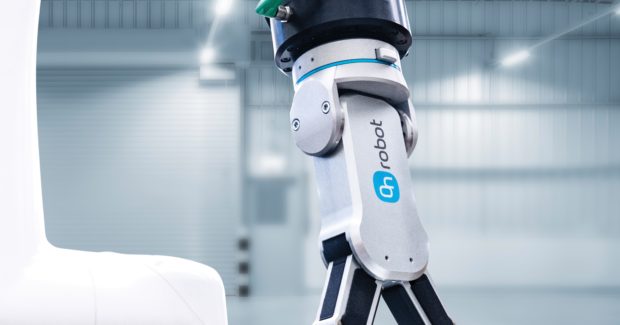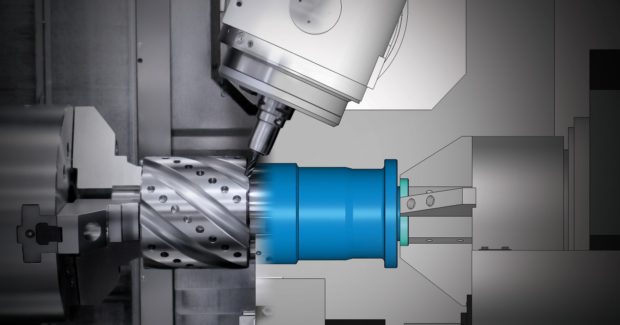More Parts in the Bin: Explore Smart Strategies at IMTS 2022
Immediately boost manufacturing efficiencies and transform your company in the long term.
Posted: July 8, 2022
The 33rd edition of IMTS – The International Manufacturing Technology Show, which runs from Sept. 12-17 at Chicago’s McCormick Place, couldn’t come at better time to help fabricators meet record high demand by implementing digital technologies.
According to the to the latest U.S. Manufacturing Technology Orders Report published by AMT – The Association For Manufacturing Technology, the first quarter of 2022 had orders totaling $1.47 billion, 26.5% higher than the first quarter of 2021 and the highest Q1 of any year since 1998.
Below are just a few of the highlights of how the nearly 2,000 exhibits at IMTS 2022 can help fabricators boost productivity with their existing talent pool and attract younger workers by using advanced yet user-friendly manufacturing technologies.
Multitasking Machines and Robots
“Small shops are gravitating to their first multitasking CNCs and robots to increase productivity, reduce the number of setups, reduce the programming time, and eliminate redundant operations,” said Greg Papke, vice president of sales and marketing – Advantec division at Mazak North America. Multitasking machines combine multiple processes. Mazak machines such as the QT-EZ 8 provide an easy path for increasing productivity by integrating robots with both turning and milling CNC machines.
“You’ll also see combined systems that can handle fixtures as well as raw materials,” said Gunther Schnitzer, president and chief technology officer, Hermle USA, which will demonstrate its RS 1 robot system connected to its Hermle C22 machining center. “Rather than having a fixture on every single pallet, the system has a robot with an NC gripper and NC workholding vice that can adjust based on workpiece size or the raw material. This lowers cost while increasing flexibility.”
“At the end of the day, the metric that matters most is the number of good parts in the bin,” said Mike Huggett, director of sales for INDEX North America. “Achieving that correlates to having multiple tools in the cut at all times, doing as much work as possible in a single setup, and reducing changeover time through offline programming.” INDEX’s new TRAUB TNL12 sliding-headstock lathe provides full 3-axis machining and a new back-working attachment that offers six tool stations. By using Virtual Machine, a digital twin optional available for every INDEX machine, users can reduce changeover time, check tool offsets and clearances to detect collisions, optimize part programs and train operators without disrupting production.
Easy-to-Use Cobots

Collaborative robots (cobots) aren’t superheroes, but they are rescuing manufacturers of all sizes from the grip of a crippling labor shortage. Cobots specialize in inspection, palletizing, welding and machine tending. A cobot may seem intimidating to program and operate, but in fact, many cobots today are designed with simplified operating and programming features that enable anyone in the shop to learn how to operate them. Cobots are easy to program, with many using a touchscreen teach pendant that leverages icon-based drag and drop functions similar to those of smartphones or tablets.
FANUC America will introduce new additions to its family of cobots, the CRX series. These cobots are designed for small- to mid-sized manufacturers considering automation for the first time, featuring advantages in ease of programming, set up and overall flexibility. Yaskawa America will have multiple cobots in action, including its HC series cobots. Attendees are invited to get a hands-on lesson in programming at the booth. Universal Robots USA will demonstrate cobots performing machine tending, machine loading and unloading, arc welding, plasma cutting and surface finishing. These cobots will feature seamlessly integrated components, grippers, software and safety accessories. Absolute Machine Tools will also demonstrate how to improve their production with robots and cobots.
“Automation will be one of the hottest trends at IMTS 2022, and DELMIA can help optimize every step of the process,” said Mike Buchli, director partner enablement, Dassault Systemes. Dassault is best known for its SOLIDWORKS design software, but the company’s DELMIA software offers the capability to create digital twins of shop floor machines, robots and factory flow. Buchli cites working with a 70-person company to optimize productivity of a multi-machine cell. After using LIDAR to create a virtual replication of the facility, they ran virtual cycle time studies and generated the production data necessary to justify a second robot and its location. The company can also optimize robotic path planning. Buchli says that if a person can learn to use a pendant, they can learn DELMIA Robot Programming.
Digital Metrology
Some of today’s 3D scanners are so accurate and the data is so clean that they can be used for feature-based measurement. Users can scan most any surface type at maximum speed and accuracy while advanced algorithms eliminate the need to adjust settings. Even better, almost anyone can learn to use them after watching a few YouTube videos.
Hexagon is focusing its innovations around three primary pillars: speed, state-of-the-art non-contact scanners that work with all types of surfaces, and ease-of-use. All of those are embodied in the Absolute Scanner AS1, their flagship cross-platform 3D scanning sensor. This modular, portable device combines a touch probe with a blue laser line scanner, and it operates with both laser trackers, portable measuring arms or even a robotic arm. The AS1 has no limit on size or complexity of the part and scans 1.2 million points per second, which is three times faster than previous flagship scanner.
Creaform’s premier product for production settings is the MetraSCAN 3D, which uses multiple laser crosses (15 in this case) to scan with an accuracy/volumetric accuracy and resolution of 0.025 mm. The measurement rate is 1.8 million points per second using blue laser technology. Manufacturing production teams can scan a part or sub-assembly in real time and get a precise image of the root cause of quality issues. By using a “scan-to-CAD” comparison combined with color mapping, which highlights deviations in geometry and textures with different colors, a technician can easily make a go/no-go decision. Users just have to scan, run the inspection, create a report, and then they have everything required for the metrologist.
While CT is often perceived as complex, ZEISS significantly simplified the process with the latest additions to its X-ray portfolio, the ZEISS METROTOM 1 and GOM Volume Inspect software. With the easy-to-use CT technology, anyone can efficiently perform complex measurement and inspection tasks with just one scan. They can measure and inspect hidden defects and internal structures that cannot be detected with tactile or optical measuring systems. Geometries, shrinkage holes or internal structures and assembly situations can be evaluated precisely. The software is suitable for beginners and combines all stages of the CT process. Users can load volume data from several components of a product, perform a trend analysis, compare the captured 3D data with the CAD model and more.
Controls and CAD-CAM
Exhibitors in these categories will showcase new digital twin and virtual solutions, for example.
“Digital twins capture data and provide critical information needed to make decisions early in the process, long before they become expensive,” said Rob Walker, manager of technical marketing for manufacturing at Autodesk. “Digital twin technology is all-encompassing, from running simulated toolpaths with automatic collision avoidance, to checking if new capital equipment will efficiently fit within a facility.”
“With the state of the industry today, users no longer struggle to get a good post-processor in combination with a virtual machine,” said Chuck Matthews, product manager of production software, Hexagon Manufacturing Intelligence. “Digital twins help companies obtain the full productivity benefits of their advanced machine in weeks instead of months.” Hexagon, which acquired ESPRIT last year, will demonstrate how to improve OEE with connected software solutions as part of Hexagon’s cloud-based SFx Asset Management application.
“A digital twin can also capture real-time machine data and optimize performance by applying AI and data analytics, functions which are available from the Okuma control and our OSP suite of applications,” said Jim Kosmala, vice president of engineering & technology at Okuma. “Job shops and small businesses should use IMTS 2022 to familiarize themselves with digital twin technology and connected systems to leverage data or they risk getting left behind. Digital technology will help them win more business in the future, especially as large manufacturers begin to require it to meet traceability and reproducibility requirements.”
HEIDENHAIN will premiere its PlantMonitor digital solution, as well as their new TNC7 control, to make the entire production environment transparent to users.
“You can’t run a business efficiently relying on raw emotions or gut instincts,” said Gisbert Ledvon, director of business development – machine tool at HEIDENHAIN. “Data really opens people’s eyes. The before-and-after situation when installing a monitoring solution follows a familiar pattern. People think they’re running at 70% efficiency because the spindle is spinning, but data proves that the machine is cutting 40% of the time. When management can see the bottlenecks, it gives them confidence to execute changes.”
Subscribe to learn the latest in manufacturing.
















